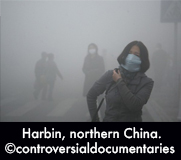By and Large, Who Pollutes?
Dr. John Bartlit
New Mexico Citizens
for Clean Air & Water
Column of February 1, 2015, Los Alamos Monitor
 A strain of common belief says super-sized contributions to election campaigns weaken environmental safeguards. All things considered, is this so?
A strain of common belief says super-sized contributions to election campaigns weaken environmental safeguards. All things considered, is this so? All things considered, no one knows. Things to consider are scattered too widely to judge as a whole.
When data are scattered widely, we naturally focus on what we see first. But we can zoom out to see more.
Begin at home. Big corporations make large donations to U.S. election campaigns; pollution from big corporations is easily seen. Ergo, some say that worse pollution stems from hefty campaign contributions.
These puzzle pieces start the idea that the quality of the land, air and water would be better sooner if corporate money had less influence in politics.
A wider scan sees more to puzzle over.
Corporate money has much less influence in Chinese politics. Yet, pollution is plainly worse in China than the U.S.
The 2008 Summer Olympics in China's capitol city, Beijing, proved the point to the world. The government shut down plants in the region during the games to improve air quality.
At a glance, we see worse harms in fumy places where corporations and capitalism alike are held in less regard than in our country. Harm simmers in many kettles of governance.
And there is more to take in. A still wider scan brings to light more complications.
Governance in Africa differs from the U.S. and China and can be more futile. Environmental interests tell us that free-lance and organized wildlife poaching is big business in Africa.
Elephants are wasted to supply more illegal ivory for world trade. Giraffes are poached to meet demands for their meat, skin, hair and more recently for heads and bone marrow that are believed to cure HIV-AIDS victims.
The Marange diamond fields of Zimbabwe are infamous for human rights abuses and for polluting the Save River with chemicals from the mines. The perpetrators are neither corporations nor governments. The culprits are rogue mine operators.
The scene is similar in Brazil. As world gold prices reach new heights, tens of thousands of miners work in illegal gold mines spreading across the Amazon rainforest.
The mines separate gold from ore by using mercury. The well-known neurotoxin spreads long distances through the region's streams and rivers.
All things considered, how sure are we that corporate money in U.S. election campaigns causes the U.S. to have noticeably worse pollution controls than elsewhere?
A variety of election systems in which monster campaign contributions play no part are seen to yield weaker environmental protections than seen in the U.S. History gives no reason to assume that election systems free of heavyweight donations give us stricter pollution rules.
If anything, the result says the opposite.
People have their own ways of apportioning blame. A grand old metaphor depicts how the busy forces that take a toll on the environment appear to us in colors.
The colors have a remarkable trait. With all the caprice of hummingbirds, shiny red or violet can turn stark black, and vice versa.
Oddly, the colors we see depend on where we sit and how we lean as we look around.
A certain point of view suggests that pollution would be controlled better if corporate money had less clout in our elections. Yet where corporate money has less clout in politics, other strong forces make pollution controls weaker than ours.
Scan the lands. Look again at our government.
See weaker governments, where power is usurped by lawbreakers.
Then see more restrictive governments that limit the power of corporations and of citizens.